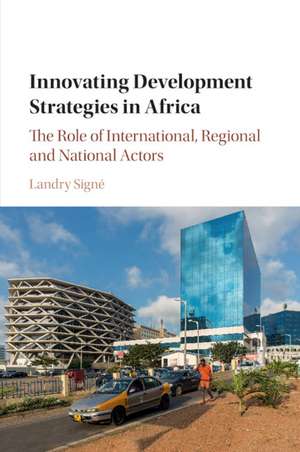Innovating Development Strategies in Africa: The Role of International, Regional and National Actors
Autor Landry Signéen Limba Engleză Paperback – 12 feb 2020
| Toate formatele și edițiile | Preț | Express |
|---|---|---|
| Paperback (1) | 282.10 lei 6-8 săpt. | |
| Cambridge University Press – 12 feb 2020 | 282.10 lei 6-8 săpt. | |
| Hardback (1) | 692.67 lei 6-8 săpt. | |
| Cambridge University Press – 30 aug 2017 | 692.67 lei 6-8 săpt. |
Preț: 282.10 lei
Nou
Puncte Express: 423
Preț estimativ în valută:
53.98€ • 56.04$ • 45.02£
53.98€ • 56.04$ • 45.02£
Carte tipărită la comandă
Livrare economică 22 martie-05 aprilie
Preluare comenzi: 021 569.72.76
Specificații
ISBN-13: 9781316625620
ISBN-10: 1316625621
Pagini: 230
Ilustrații: 7 b/w illus. 17 tables
Dimensiuni: 152 x 230 x 14 mm
Greutate: 0.32 kg
Editura: Cambridge University Press
Colecția Cambridge University Press
Locul publicării:Cambridge, United Kingdom
ISBN-10: 1316625621
Pagini: 230
Ilustrații: 7 b/w illus. 17 tables
Dimensiuni: 152 x 230 x 14 mm
Greutate: 0.32 kg
Editura: Cambridge University Press
Colecția Cambridge University Press
Locul publicării:Cambridge, United Kingdom
Cuprins
1. Innovation in African economic development strategy: literature review and conceptual clarification; 2. Theoretical and methodological framework: ideas, interests, institutions, time, and the role of international, regional, and national actors in economic development strategy; 3. Time, historical context, and innovation in African development strategies; 4. Ideas, values, paradigms and policy innovations in Africa; 5. Interests, strategies, and policy innovation in Africa; 6. How do international, regional, and national actors affect innovation in African development strategies?
Recenzii
'Innovating Development Strategies in Africa is a bold and ambitious undertaking in which Professor Landry Signé, Africa's own esteemed and world-renowned expert on international and African affairs, masterfully illustrates more than five decades of economic development strategies and transformations in Africa … As a former head of state, I have been delighted to read this inspirational book, and would have loved having access to its prodigious perspective while in office as president of Malawi. I urge everyone, especially my fellow African leaders and our international counterparts, to read this remarkable book.' Her Excellency Joyce Banda, First Female President of the Republic of Malawi
'Landry Signé has succeeded in applying rigorous, original thinking to one of the most important development issues of our time: the rapid economic and political changes occurring in much of Africa. Signé's framework simultaneously captures the diversity of experiences across the continent while providing a consistent framework for understanding the forces behind these changes. This important work by a rising academic star is a must read for anyone interested in comparative politics, development policy, and international relations, especially in Africa.' Steven Radelet, Donald F. McHenry Chair in Global Human Development at Georgetown University, former Chief Economist of USAID, former Senior Adviser to the United States Secretary of State, and Adviser to Her Excellency Ellen Johnson Sirleaf, President of the Republic of Liberia
'This book has two major strengths. It uses a framework in which interests, ideas and institutions all matter. This is surely right, and opens avenues of enquiry that are otherwise missed. The other is that is it manageably comparative: by focusing on nine countries of Francophone Africa it has an arena in which divergence can meaningfully be explored. We need more books like this.' Paul Collier, Oxford University
'This seminal book is an outstanding contribution to the understanding of the policy-making process and evolution of economic development strategies in Africa. The book is an elegant demonstration of how ideas, interests and institutions have evolved over time in Africa, including during the structural adjustment period, shaping the actions of international, regional, and national players. Landry Signé, one of the most innovative thinkers of his generation, takes the readers on an edifying journey that will change their views of Africa.' Albert G. Zeufack, Chief Economist, Africa Region, World Bank
'Professor Signé has produced a much needed road map to understand how and why the continent has been and is changing, and the different variations in these processes … The book chooses the option of greater complexity, by focusing on the interaction between the three variables in order to develop a more sophisticated theory of change, in which certain choices are made, while other, perhaps more desirable choices never seemed possible, at least in some of the countries of the region.' Nicolas van de Walle, Maxwell M. Upson Professor of Government, Cornell University
'Dr Signé has viewed the development community from within. He views his experiences in the policy world from the vantage point of a trained professional and teaches us what he has learned in lucid and balanced prose. This book places us in his debt.' Robert H. Bates, Eaton Professor of the Science of Government, Harvard University
'Africa is often portrayed as a (reluctant) consumer of externally imposed development strategies. Dr Signé's book challenges this view. Using nine country case studies, he seeks to demonstrate that African countries were not passive recipients of internationally driven development programs such as the Structural Adjustment Programs prevalent in the 1980s. He argues that the heavy contestation about the appropriate role of State led to a push-and-pull between international and African ideas, interests, and processes related to development. This resulted in the emergence of new African development approaches and strategies such as the Lagos Plan of Action and the New Partnership for Africa's Development, as well as the domestication of some aspects of international development approaches. This book is a must-read for anyone interested in understanding the evolution and trajectories of development approaches in post-independence Africa.' Monde Muyangwa, Africa Program Director, Woodrow Wilson Center for International Scholars
'Professor Signé offers a highly original take on Africa's development trajectory since independence. In focusing our attention on innovations in development strategy, Signé illuminates how African governments have changed both the policies they choose and the institutional means by which they choose them. Drawing on a thoughtful analysis of nine cases in francophone Africa, Signé captures the transition from structural adjustment to new frameworks and approaches, including the New Partnership for Africa's Development. His approach challenges scholars to think critically about mechanisms of policy innovation on the continent, and to take seriously the ways in which national governments and regional organizations are reshaping the contours of development strategy.' Jeremy Weinstein, Stanford University, former Deputy to the US Ambassador to the United Nations and former Director for Development and Democracy on the National Security Council staff at the White House
'Landry Signé has succeeded in applying rigorous, original thinking to one of the most important development issues of our time: the rapid economic and political changes occurring in much of Africa. Signé's framework simultaneously captures the diversity of experiences across the continent while providing a consistent framework for understanding the forces behind these changes. This important work by a rising academic star is a must read for anyone interested in comparative politics, development policy, and international relations, especially in Africa.' Steven Radelet, Donald F. McHenry Chair in Global Human Development at Georgetown University, former Chief Economist of USAID, former Senior Adviser to the United States Secretary of State, and Adviser to Her Excellency Ellen Johnson Sirleaf, President of the Republic of Liberia
'This book has two major strengths. It uses a framework in which interests, ideas and institutions all matter. This is surely right, and opens avenues of enquiry that are otherwise missed. The other is that is it manageably comparative: by focusing on nine countries of Francophone Africa it has an arena in which divergence can meaningfully be explored. We need more books like this.' Paul Collier, Oxford University
'This seminal book is an outstanding contribution to the understanding of the policy-making process and evolution of economic development strategies in Africa. The book is an elegant demonstration of how ideas, interests and institutions have evolved over time in Africa, including during the structural adjustment period, shaping the actions of international, regional, and national players. Landry Signé, one of the most innovative thinkers of his generation, takes the readers on an edifying journey that will change their views of Africa.' Albert G. Zeufack, Chief Economist, Africa Region, World Bank
'Professor Signé has produced a much needed road map to understand how and why the continent has been and is changing, and the different variations in these processes … The book chooses the option of greater complexity, by focusing on the interaction between the three variables in order to develop a more sophisticated theory of change, in which certain choices are made, while other, perhaps more desirable choices never seemed possible, at least in some of the countries of the region.' Nicolas van de Walle, Maxwell M. Upson Professor of Government, Cornell University
'Dr Signé has viewed the development community from within. He views his experiences in the policy world from the vantage point of a trained professional and teaches us what he has learned in lucid and balanced prose. This book places us in his debt.' Robert H. Bates, Eaton Professor of the Science of Government, Harvard University
'Africa is often portrayed as a (reluctant) consumer of externally imposed development strategies. Dr Signé's book challenges this view. Using nine country case studies, he seeks to demonstrate that African countries were not passive recipients of internationally driven development programs such as the Structural Adjustment Programs prevalent in the 1980s. He argues that the heavy contestation about the appropriate role of State led to a push-and-pull between international and African ideas, interests, and processes related to development. This resulted in the emergence of new African development approaches and strategies such as the Lagos Plan of Action and the New Partnership for Africa's Development, as well as the domestication of some aspects of international development approaches. This book is a must-read for anyone interested in understanding the evolution and trajectories of development approaches in post-independence Africa.' Monde Muyangwa, Africa Program Director, Woodrow Wilson Center for International Scholars
'Professor Signé offers a highly original take on Africa's development trajectory since independence. In focusing our attention on innovations in development strategy, Signé illuminates how African governments have changed both the policies they choose and the institutional means by which they choose them. Drawing on a thoughtful analysis of nine cases in francophone Africa, Signé captures the transition from structural adjustment to new frameworks and approaches, including the New Partnership for Africa's Development. His approach challenges scholars to think critically about mechanisms of policy innovation on the continent, and to take seriously the ways in which national governments and regional organizations are reshaping the contours of development strategy.' Jeremy Weinstein, Stanford University, former Deputy to the US Ambassador to the United Nations and former Director for Development and Democracy on the National Security Council staff at the White House
Notă biografică
Descriere
This book examines postcolonial strategies for economic development in Africa from the 1960s to the present day.
















